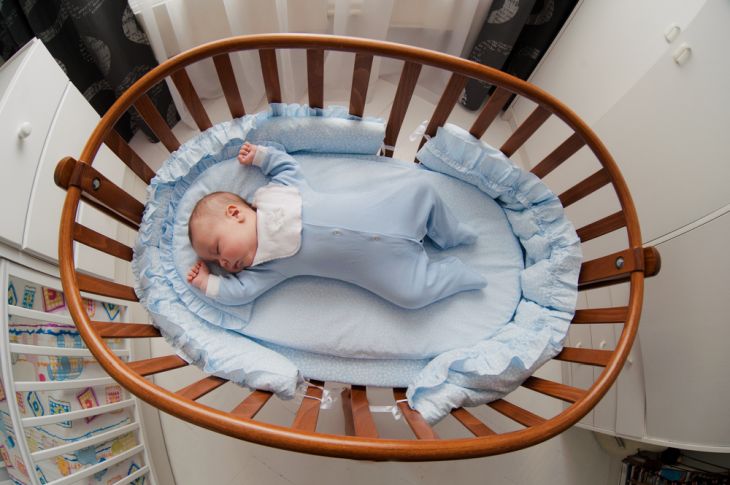There are times when you feel so blessed to look at your little newborn sleeping nicely at night. The sleep is sound, and their breath is a blessing to you.
However, everything would change if they experienced some sleeping problems. I admit, and many will agree with me, that no nightmare can be as bad as a newborn with a sleepless night.
That leads us to a problem called “sleep regression.” And any parent is likely to experience it. Let’s figure out what it is and what to do in the hope of ending this problem.
What Is A Sleep Regression?

Sleep regression can be characterized as waking frequently and then refusing to go back to sleep in a baby. Regression is more likely to happen around 4 months after birth.
4-month sleep regression is said to change the baby’s sleeping routine completely. Most babies sleep in the baby’s way before this happens. In other words, babies are prone to sleep anywhere due to the lack of distinct sleep stages adults have.
Nevertheless, after regression happens, the newborn becomes more similar to us in a sleeping way. They have to cycle from light to deep sleep.
Thus, many people are wondering if 4-month sleep regression is good. Yes, it is a natural stage of the baby’s development. It is the same as when your baby has the first walk.
From my point of view, you should not be too worried about sleep regression to avoid being tired and causing your baby to be tired.
While sleep regression marks a big change in your baby’s development, you might also find this uncomfortable. Your baby usually wakes up at night, which sometimes deprives of your sleep and urges you to comfort them all night.
As a consequence, many parents experience a lack of sleep and stress during this period. Learning how to confront it is crucial, therefore.
What Causes the “4 Month Sleep Regression”?
4 months after birth is a hectic moment for most newborns. The baby’s sleep will undergo a series of changes during this period, and it is better to know the reasons before you try to manage it well.
Before your baby reaches the point of 4 months, they are likely to fall into non-REM sleep immediately when falling asleep. It explains why you can nurse or even rock the baby, but they do not wake up easily.
It is also the reason why they can fall asleep almost everywhere. It makes everything simple and convenient for you to see them sleep in your car seat or the stroller as you want a walk.
But everything would change permanently around 4 months after birth. They become more similar to us – adults – the way of sleeping. Non-REM deep sleep does not occur immediately after they fall asleep.
On the other hand, the non-REM lighter stage will take place. And the baby becomes more sensitive. If you rock or nurse them in this stage, they will get up instantly and be ready to cause a mess at midnight, destroying your efforts to sleep.
You can help the baby come back to sleep, of course. But the process may be repeated many times. And this has devastating consequences on their health.
Moreover, 4 months marks the moment when some babies start rolling. This makes you unable to use a swaddle anymore due to the lack of safety. However, the removal of the swaddle is sometimes the main reason for the 4-month sleep regression.
Babies might still experience their startle reflex that should be prevented thanks to the use of a swaddle. Without being swaddled, your baby might wake up themselves or face some troubles falling asleep.
Besides, your baby’s sleeping schedule might undergo a series of changes in patterns after 4 months. Before, they might sleep even until 8.00 in the morning, but after 4 months, it changes to earlier, around 6.
This change requires parents to be aware and make necessary changes to the baby’s sleeping time. For example, you should let them sleep earlier to ensure that the baby has got enough hours for sleeping.
Many parents are misled that letting babies sleep later will make them fall asleep more easily. It is a completely false belief. It makes them wake up earlier in the morning and causes tiredness, and affects their health severely.
Around 4 months, many babies start finding it hard to fall asleep as easily as before. They start being more aware of anything around them.
On the other hand, some ways of soothing your baby might become useless or even counter-productive after 4 months.
Some parents even try to force their babies to follow their planned schedule, including sleeping. Nevertheless, this strategy does not work, and in many cases, your baby even wakes up more frequently at night.
What Happens During A Sleep Regression?

As claimed above, sleep regression is not a health problem itself. To be exact, it is a series of changes in sleep patterns that are natural in a baby’s growth.
Nonetheless, many babies will have many uncomfortable symptoms of sleep regression, and they drive parents crazy. Let’s check what happens during a sleep regression to help you find the best solution to it.
1. Increased Fussiness
Fussiness is an obvious characteristic of a baby all the time. But there are still some limits to a baby’s fussiness in normal conditions, and you probably can stand it over time.
You can find many easy and effective methods to calm their fussiness instantly and stop annoying yourself and the people around you.
When sleep regression happens, you will even witness worse fussiness caused by your baby, especially if they get up at night. This is a clear sign of regression, whether your baby is 4 months old or not.
2. Regular Waking At Night
Obviously, this is one of the most common signs that every baby experiences during a sleep regression. The definition of sleep regression includes the regular waking at night and their inability to fall asleep easily.
Of course, waking at night is not something unusual for newborns. Even your one-month-old can wake up right at midnight because he is hungry. Feeding and changing diapers are other popular reasons to explain for baby’s regular waking.
Nonetheless, if you notice the high frequency, perhaps over twice per night, sleep regression is highly likely.
3. Longer Napping

Hardly can the balance be broken without leaving consequences. When your baby does not enjoy sufficient sleep at night because of waking frequently, they will become more tired.
As a result, they have many more naps during the day. Or the amount they spend on napping might extend longer.
Even though there is no scientific study to illustrate the association between increased napping and health problems, sleeping at night still plays an essential role.
4. Appetite Change
At 4 months, you find it challenging to record any enormous change in the baby’s appetite. The reason is that they are still used to formula or breast milk.
But sleep regression will come with several accompanying symptoms related to the baby’s appetite, such as spitting out or latching difficulties.
5. Inconsolable without Reason
Fussing and crying seem to be the only way in which your baby tries to express themselves. However, if they reach the point that you or your partner cannot soothe them anymore, the likelihood is a sleep regression.
Do not be disappointed or give up at this stage. It would be best if you were patient with mommy’s snuggles, and it even requires much more effort in this period to overcome the difficulty.
6. Restless
Maybe after several hours of making fussiness, your baby decides to go back to sleep. But the truth is that they are still restless.
It means that your babies might not stay in one position for the whole time. Or they might not be really into a deep sleep as you wish them to do. With all the annoying signs of sleep regression as above, you can easily guess many problems to come.
Undeniably, sleep regression brings positive sides. Otherwise, it cannot be a part of natural development. For example, when sleep regression is over, you will likely see considerable differences in the baby’s weight or height.
Behind it are many possible risks as well.
Your baby experiences a loss of sleep which has severe effects on their health. Also, it affects you as parents. Your patience will be lost throughout time due to the lack of adequate rest.
Tiredness and impatience might destroy you, and sometimes, you even want to give up on your baby’s console. Trust me, the time will come, and you have to be strong to overcome it.
This is not to mention the fact that emotion is the most vulnerable factor when sleep regression occurs. Many parents admit to seeing themselves as failures because they cannot do anything. Just remember that it is normal and you can do it.
When Does the 4 Month Sleep Regression End?
Having witnessed 4-month sleep regression in your baby, some of you might claim that it would be gone within several days or weeks. Everything will be normal again, and there is nothing to worry about.
However, we should be aware that it is the luckiest scenario. Not everyone is so lucky, and the possibility is that you might suffer from this for longer.
Most people are seriously concerned about the question, “when does it end?” Not only the baby but also their parents find this problem irritating.
In normal circumstances, sleep regression will disappear after 2 or 6 weeks. This amount of time allows the baby to soothe themselves and stop waking up suddenly at night.
4 Month Sleep Regression: Tips to Cope
There is a fact you need to accept: sleep regression will not go away. 4-month sleep regression will leave permanent changes in your baby, unlike other regressions that occur later in their lives.
However, there is no need to be depressed about it. Methods to overcome sleep regression are available for anyone who wishes to spend time and energy on research.
Before going directly into each tip to cope with sleep regression, I want to persuade you to do the best. Despite being exhausted and depressed, you need to convince yourself to do so.
Below are several tips to help you address sleep regression and save both of you from exhausting situations.
1. Early Bedtime

Many adults find it logical that sleeping late will make the baby fall asleep more easily, saving a lot of energy to comfort them. However, it is a completely unreasonable method.
In fact, the recommendation to deal with 4-month sleep regression is to concentrate on earlier bedtime for your baby. It plays a crucial role in the baby’s rest.
Normally, babies are claimed to fall asleep from 6 to 8 pm, which is a reasonable bedtime. If your baby usually sleeps at 7 pm or later, it is possible to start making slight changes in their patterns.
You can set up a new routine with the support of massage, songs, or even a bath to help your baby fall asleep better.
2. Separate Room
A new lesson that a baby needs to learn from this period is to fall asleep by himself. If parents try to intervene too much, sleep regression might lose its significance in the baby’s growth.
Therefore, please decide to make the baby sleep in another room. It may not be easy initially, but it allows the baby to learn how to go to bed independently in the long term. And if so, you will feel very relieved.
Many things are worth your concern, though. For example, you should pay more attention to the room temperature or the comfort of the sheets.
You had better use a white noise machine which aims at providing a comfortable background noise, resembling womb.
Some standards should be followed to get the best results, as mentioned below.
3. Dark Room
The sleeping environment has a significant influence on the quality of sleep, and it is similar to the baby as well. Even though some babies might not like the darkness, it is a good idea to make them familiar with it as soon as possible.
Darkness is one of the most important factors that experts recommend for every baby room. When the room becomes dark, it might serve as a sign for them to fall asleep.
Also, even when they wake up suddenly at night, darkness makes them realize the need to come back to sleep.
With the help of blackout drapes, you can easily prevent any intrusive light into the room. It will become a perfect environment for the baby to cope with sleep regression.
4. Drowsy But Not Sleeping

It sounds ridiculous at first, making the baby feel asleep but not making them sleep? Wait, you need to bear in mind one thing. The key in 4-month sleep regression is to train your baby to sleep themselves and self-soothe.
Thus, you need to enhance your baby’s independence regarding sleeping, which can be done with this method.
Once you notice a sign of drowse in your baby, it is high time to get them into the bed. Waiting for them to fall asleep is counter-productive in many cases.
5. Sleep Routine
The establishment of a sleep routine in a 4-month-old baby remains a controversial issue. Many people think it is too early to think about that, but as I said before, no baby has the same experience.
Sleep routine has specific positive impacts on the baby during a 4-month sleep regression, and it will teach them to deal with this period more easily, especially regarding independent sleep skills.
There is one particular routine that has been supported by many parents around the world – known as E.A.S.Y, which is Eat, Activity, Sleep, and You.
In the first step known (Eat), you are supposed to feed the baby right after waking up.
Once the feeding is complete, your baby will be happier. This is a perfect moment to connect and snuggle with your baby. Some recommended activities are reading books, chatting, or practicing tummy time.
Your major goal is to make your baby sleep again before they become too tired. Thus, you had better keep the awake period very short (but still very sweet, though).
Last but not least, your baby is now in their sleep. It is possible to do whatever you want, watching a movie or relaxing in a warm bath.
The E.A.S.Y routine will be repeated and again all day long.
6. Night Feeding

There are 3 major points that your baby is supposed to learn during the stage of 4-month sleep regression. They are soothing skills, right bedtime, and suitable nap times.
Before the learning process is complete, your baby might need feeding at night, which is completely normal.
You are free to feed the baby to make them satisfied, and there is no reason to stop. Once the baby receives enough feeding, they are more likely to fall asleep again. After all, craving for food is not an inappropriate demand.
7. Be Flexible
Flexibility is an important quality that every parent should have to deal with minor changes in the baby’s sleeping patterns.
You had better avoid a rigid schedule all the time. Instead, you need to concentrate on observing your baby’s habits and changes, from fussing to eye rubbing, to understand their needs to the fullest extent.
8. Act Less and Talk Less
Some parents find themselves frustrated and instantly soothe the baby when they hear their fussiness at night. It is not a good tip for solving sleep regression.
Instead, you should avoid picking them up or even talking to them. Keep the room always dark as a reminder for the baby that bedtime still lasts.
Sometimes, if you turn on the light so quickly to check the baby, you accidentally worsen they’re waking up and make it more challenging for them to go back to sleep.
In other words, minimizing conversations and actions is the ultimate way to teach your baby necessary new skills from now on.
9. Be Calm
Dealing with babies in the first months is exhausting, no matter how well you have prepared before birth. And 4-month sleep regression even worsens everything.
Thus, staying calm is seen as one of the most important (and difficult) qualities you have to train yourself to have. Your calmness will be delivered to your baby as well.
Just a slight sign of your stress or erratic condition might cause your baby to realize and respond immediately. You do not want it to happen because it only exhausts you more.
10. Be Patient
If calmness helps you overcome the difficulty during the first months, patience is necessary to handle sleep regression. Do not think that your baby is trying to exhaust you.
They might be as tired as you are and the best way for both of you is to find a suitable strategy as soon as possible.
11. Ask for Help
Asking for help sounds like you are extremely desperate, and there is no other option but to have somebody solve your problem. As a result, many parents are very reluctant to this solution.
Help from professional experts or even a friend is necessary, especially when you can no longer control the situation.
Help from other sources will allow you to be free from 4-month sleep regression more quickly. Thus, you can avoid being depressed or overtired.
4 Month Sleep Regression: How to Avoid It Forever

Until now, you have acquired a profound understanding of solutions to sleep regression and its definition and symptoms. The next question that we need to address is how to avoid it in the future.
If you scroll right below this section, you are going to find out that sleep regression might re-appear in other moments of your baby’s life. And it comes very soon. Thus, it is important to know methods of avoiding sleep regression.
In fact, it is a simple secret. You need to recognize your baby’s demands on time and, thus, adjust a flexible schedule to fit your baby’s needs.
Not everything you think must be right is appropriate for your baby. An example is a habit of letting the baby sleep later, as I mentioned above.
When some methods do not work, it is high time to end it and switch to another in the hope of bringing the best outcomes for your baby.
Sleep coaching is a crucial part that you need to implement at this stage.
In the beginning, you need to observe the baby’s way of falling asleep, which is their sleep pattern. For instance, many babies seem to require their parent’s feeding, rocking, or holding to fall asleep.
When you have identified their patterns, you start sleep coaching by slowly changing their way. This aims to enable them to sleep alone.
In fact, many methods can be found and applied, and you have to consider many factors, such as the family conditions or the baby’s temperament.
Helping your baby fall asleep alone is important too. It helps the baby return to sleep even when they wake up suddenly at night.
When the method is successful, you do not need to run around your house at 2 AM to comfort your baby.
Overall, no matter what strategies you go for, you have to make sure that it is suitable for your baby. Forcing does not bring good results after all.
Did You Know There Is Another Sleep Regression Around 9, 11 and 18 Months?
Sleep regression should not be considered as a problem, I repeat. Every parent needs to remember that it reminds them of forming healthy sleep patterns in their baby.
4-month sleep regression is the most popular, but it does not mean that sleep regression will happen only once. Even when you have managed it well, the probability is that you have struggled ahead many times.
Therefore, make sure that you listened to us carefully when we introduced methods to avoid sleep regression and its negative effects.
Conclusion
In general, it is unnecessary to be worried too much about the 4-month sleep regression. It is completely natural if your baby (and you) experiences it.
You should be happy because it signifies that your baby is entering a new development step of their life. It is just as exciting as learning to walk or talk.
For the sake of yourself and your baby, you still need to prepare the best to cope with sleep regression. Above are some crucial tips which I believe can help you handle it well.
Although sleep regression might come in later months, you have the experience to minimize its effects on your life.
If you are satisfied with our article, please make multiple shares to help everyone know what to do with the 4-month sleep regression.
FAQ
The 4-month sleep regression stands out from others, of course, because it is the first experience of every baby. The next sleep regression is claimed to happen around 8 or 9 months, but you know the solutions at that time.
Loss of sleep is never a simple problem for both adults and babies. But with experience, you will manage it well the next time. Work on your schedule and develop a healthy routine that guarantees enough rest for both you and your baby.
Sleep regression happens when the baby grows, and we all know that not every individual is the same. Therefore, it is likely that your first baby will experience it while the second does not. It is completely normal.
Do not waste too much energy and time on finding out the reason or something to blame. Just accept it and learn what to do then.
If more-than-5-year-old children still suffer from sleep regression, it is necessary to ask the doctor for professional advice immediately. It might be a sign of some underlying problems in these circumstances, such as anemia or reflux.
How many hours your 4-month-old baby should spend sleeping is a controversy.
At the age of 4 months, the baby seems to reduce the nap during the day. Therefore, night bedtime becomes more and more important because it plays an essential part in developing their body.
Bedtime for babies is more flexible and depends on each individual, but normally, we can develop a general schedule to know how much they need to sleep.
4 months after birth, there is a transition in the babies, perhaps from 4 to 3 naps. If you notice your baby has only 3 naps, it is a sign that you need to come up with an early bedtime for babies.
Many parents are frightened of early bedtime when there are nap transitions. Do not be afraid of it. In fact, it will save you from many troubles.
In this stage, you should make sure that all naps end by 5 pm. Then, your baby had a better fall asleep around 7:15 pm or earlier.



